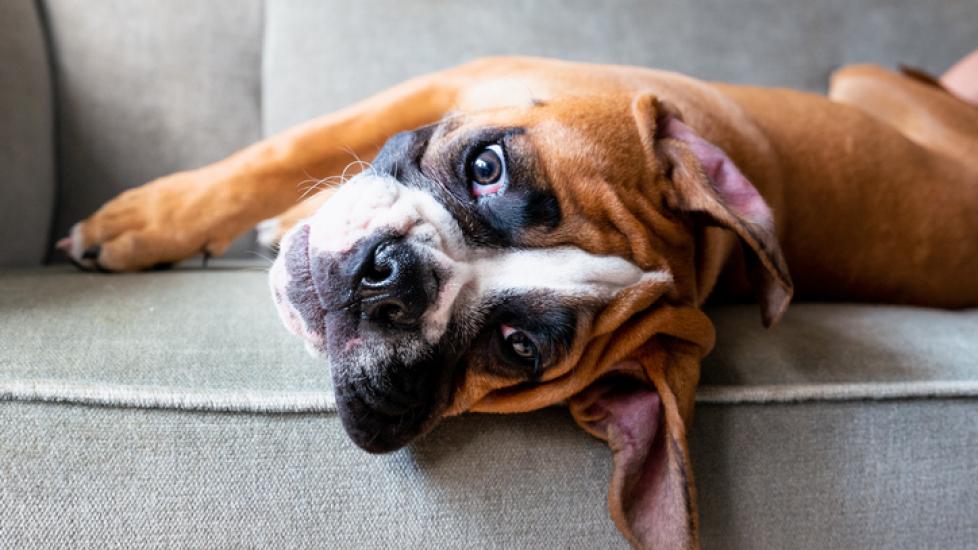Reverse Sneezing in Dogs: Causes and What to Do
iStock/fotografixx
Reverse sneezing in dogs can be alarming if you’ve never experienced it before. But, luckily, it’s not quite as scary as it sounds.
Reverse sneezing occurs primarily in dogs and much less frequently in cats. Here’s what you need to know about reverse dog sneezing and what you can do to help stop it.
What Is Reverse Sneezing in Dogs?
Reverse sneezing, or an inward sneeze, is a sudden, involuntary respiratory reflex. It occurs when a dog’s soft palate (the soft part on the roof of the mouth that separates the nasal passage from the oral cavity) becomes irritated.
This irritation causes the soft palate muscles to spasm, resulting in a temporary narrowing of the trachea. The dog extends his neck as he expands his chest to breath, but the narrowed trachea makes it difficult for the dog to fully inhale like normal. The dog then repeatedly attempts to inhale through his nose, which results in a snorting noise.
Why Do Dogs Reverse Sneeze?
Dogs most commonly reverse sneeze to expel an irritant from the soft palate or throat. This is similar to how dogs sneeze to remove irritants from their noses. Anything that irritates the soft palate can lead to a reverse sneezing episode, including a blade of grass, pollen, or dirt.
If a dog is having frequent reverse sneezing episodes, he should be brought to a veterinarian to identify the trigger and determine long-term management strategies.
Other causes of soft palate irritation that may result in reverse sneezing include the following:
-
Household products (perfume, cleaning products, air fresheners)
-
Pulling on the leash while attached to a collar
-
Overexcitement
-
Exercise intolerance
-
Objects in the throat (such as a foreign body or a mass)
-
Nasal mites
-
Elongated soft palate (common in brachycephalic breeds)
-
Eating or drinking
What Does Reverse Sneezing in Dogs Sound Like?
Reverse sneezing in dogs sounds like the dog is actually inhaling their sneezes, hence the name “reverse sneezing.” It’s a loud, snorting sound that can sometimes sound like a goose honking or be confused with the dog choking.
If possible, take a video of the episode to show your veterinarian. And if you have any concern that your dog may be choking, call your vet immediately.
How to Stop Reverse Sneezing in Dogs
There are a variety of different tricks pet parents can perform to try to stop a reverse sneezing episode. Some suggest gently blowing in the dog’s face for a few seconds to make him swallow, which helps stop the sneezing. Massaging the dog’s throat may also stop the spasm.
The good news is that reverse sneezing episodes will resolve on their own in less than one minute, even if a pet parent does not feel comfortable intervening.
If the problem is chronic, a veterinarian will have to diagnose the underlying cause and provide appropriate treatment.
When to Go to The Vet for Reverse Sneezing
If a dog has never had an episode before, It's best to check with a veterinarian to ensure that it actually was reverse sneezing and not something more serious, such as a collapsed trachea which causes a similar-sounding cough.
If the episode Is short-lived and the dog quickly returns to normal and has no other symptoms (difficulty breathing or weakness, for example), it is generally fine to mention the episode at the dog's next veterinary checkup.
However, if episodes are frequently recurring, your dog should see a veterinarian promptly to check for an underlying cause.
How Do Vets Diagnose Reverse Sneezing?
Your veterinarian will ask whether your dog was exposed to any respiratory irritants, has seasonal allergies, or ingested any foreign objects.
If you were able to get the episode on video, that’s extremely helpful for the veterinarian in determining if your dog experienced reverse sneezing (chances are, your pup won’t do it again while at the vet’s office).
Your veterinarian will also perform a physical examination to assess your pet’s heart and lungs, and they’ll look for any other respiratory signs such as nasal discharge or an increased respiratory rate or effort. A complete blood count, serum blood chemistry, and urinalysis will all likely be recommended for a baseline evaluation.
Additional tests may be performed to rule out other causes of similar snorting noises, such as:
-
Nasal foreign body
-
Upper respiratory tract infection
These tests may include a chest X-ray, a sedated oral and nasal exam, and possibly a rhinoscopy (where a camera is inserted in the nasal cavity) to look for any abnormalities.
Dog Reverse Sneeze Treatment
Generally, reverse sneezing does not require medication or treatment and is typically a fairly benign condition—as long as it’s infrequent.
In frequent or severe cases of reverse sneezing, your veterinarian may prescribe medications to treat the underlying cause or provide symptomatic care.
For example, if allergies trigger reverse sneezing episodes, the veterinarian may prescribe anti-histamines, such as cetirizine, or steroids, such as prednisone.
While rare, if nasal mites are diagnosed, your vet will treat your dog with an anti-parasitic medication, such as ivermectin or milbemycin oxime, to eliminate them.
If pet parents know of allergens or irritants that cause a reverse sneezing episode, they should reduce their dog's exposure to them. Avoid using household chemicals within common cleaners while the dog is present.
If a dog is having frequent reverse sneezing episodes, he should be brought to a veterinarian to identify the trigger and determine long-term management strategies.
FAQ:
How long do episodes of reverse sneezing last?
Bouts of reverse sneezing in dogs will usually last only about 30 seconds or less, although it might feel like a lot longer. The dog will act completely normal before and after the episode.
